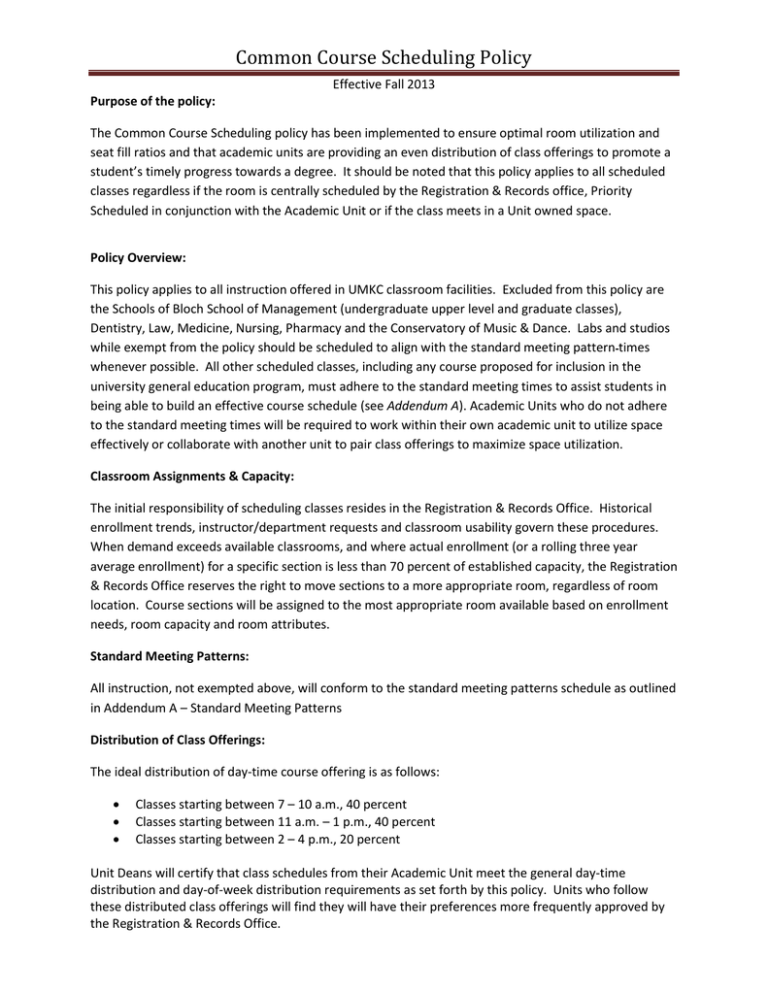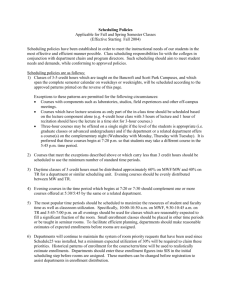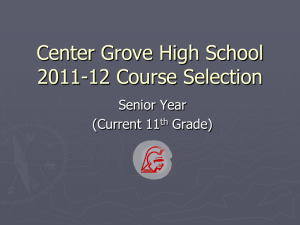Common Course Scheduling Policy
advertisement

Common Course Scheduling Policy Effective Fall 2013 Purpose of the policy: The Common Course Scheduling policy has been implemented to ensure optimal room utilization and seat fill ratios and that academic units are providing an even distribution of class offerings to promote a student’s timely progress towards a degree. It should be noted that this policy applies to all scheduled classes regardless if the room is centrally scheduled by the Registration & Records office, Priority Scheduled in conjunction with the Academic Unit or if the class meets in a Unit owned space. Policy Overview: This policy applies to all instruction offered in UMKC classroom facilities. Excluded from this policy are the Schools of Bloch School of Management (undergraduate upper level and graduate classes), Dentistry, Law, Medicine, Nursing, Pharmacy and the Conservatory of Music & Dance. Labs and studios while exempt from the policy should be scheduled to align with the standard meeting pattern times whenever possible. All other scheduled classes, including any course proposed for inclusion in the university general education program, must adhere to the standard meeting times to assist students in being able to build an effective course schedule (see Addendum A). Academic Units who do not adhere to the standard meeting times will be required to work within their own academic unit to utilize space effectively or collaborate with another unit to pair class offerings to maximize space utilization. Classroom Assignments & Capacity: The initial responsibility of scheduling classes resides in the Registration & Records Office. Historical enrollment trends, instructor/department requests and classroom usability govern these procedures. When demand exceeds available classrooms, and where actual enrollment (or a rolling three year average enrollment) for a specific section is less than 70 percent of established capacity, the Registration & Records Office reserves the right to move sections to a more appropriate room, regardless of room location. Course sections will be assigned to the most appropriate room available based on enrollment needs, room capacity and room attributes. Standard Meeting Patterns: All instruction, not exempted above, will conform to the standard meeting patterns schedule as outlined in Addendum A – Standard Meeting Patterns Distribution of Class Offerings: The ideal distribution of day-time course offering is as follows: Classes starting between 7 – 10 a.m., 40 percent Classes starting between 11 a.m. – 1 p.m., 40 percent Classes starting between 2 – 4 p.m., 20 percent Unit Deans will certify that class schedules from their Academic Unit meet the general day-time distribution and day-of-week distribution requirements as set forth by this policy. Units who follow these distributed class offerings will find they will have their preferences more frequently approved by the Registration & Records Office. Common Course Scheduling Policy Effective Fall 2013 Classroom Inventory: UMKC will periodically conduct a review of space, and where appropriate the Provost may transfer space to the general classroom pool. Process for granting scheduling exceptions: Academic Units will be required to submit a request to the Provost each semester for all classes which they wish to schedule outside of the Standard Meeting Times. If approved, the Provost will notify the Registrar who will notate the change in the schedule of classes. For additional scheduling information visit “Procedures for scheduling classes and classrooms.” Scheduling Terminology: The following is a list of scheduling terms that are used in conjunction with Ad Astra scheduling software and scheduled class sections. Instruction Modes: Instruction Mode p B OS OA VI Description Classroom Based Definition The class meets face-to-face on a regular schedule for the required 750 minutes per credit hour time period. The class may meet in a classroom on-campus or at an alternative physical meeting location. The class may use the Internet to accompany in-person instruction. Example: Class X meets MWF at 10am in Royall 102. Blended class The class meets face-to-face on a regular schedule (weekly, bi-weekly, or monthly), typically in a classroom on-campus, but may be at an instruction alternative physical meeting location. A portion of the 750 minutes/credit hour time period for the class is delivered via the Internet rather than in a physical classroom. It is sometimes called hybrid. Example: Class Y meets MW at 10am in Royall 102 and F class time is replaced by Web instruction/activities. On-line The class is primarily online, and students must gather online at the Synchronous same time regularly (weekly, bi-weekly, or monthly) for ‘meetings’ via the Internet. The class may have minimal in-person meetings, like an orientation at the start of the term or the requirement for in-person, proctored exams. On-line The class is primarily online, with no required online meetings, students Asynchronous may complete the work on their own timeline throughout the semester. The class may have minimal in-person meetings, like an orientation at the start of the term or the requirement for in-person, proctored exams. The class meets via interactive video conference on a regular schedule Video for the required 750 minutes per credit hour time period. The class generally meets at on off sight location or students may have the option of attending the class by logging in through a LMS system. Common Course Scheduling Policy Effective Fall 2013 Ad Astra Scheduling Terms: Term Standard Meeting Patterns Room Hours/Week Room Hour Utilization Prime Ratio Bottleneck Station Fill Ad Astra Optimizer Definition A common set of scheduling times that all scheduled classes must adhere to unless otherwise approved as an exception. Actual hours a room is used in an average week during the analyzed term. Percentage of room hours used (Total Room Hours / (Scheduling week (70, 20, 12 hours) x Number of rooms with specified room type)). Percentage of hours scheduled during primetime hours (Prime room hours / Total Room Hours). 80 percent utilization or higher of a particular room type Percentage of seats in use when room is scheduled (Actual or Max Enrollment / Capacity). Functionality provided in the Ad Astra system that schedules centrally scheduled rooms based on the best-fit “max capacity” for the class and the “capacity” and classroom requirements (e.g. ILE Room) Requested Room Capacity The amount of seats requested by the academic unit. Max Room Capacity (Enrollment Capacity) The amount of seats a room holds based on the Campus Facility Management fire code requirements. Department Scheduled Rooms that are controlled by the Department. Department Priority Scheduled Centrally Scheduled Rooms that are shared with the Registration & Records Office. Departments have the ability to schedule their own classes and meetings and the Registration & Records Office can then use the space for additional classroom scheduling Classrooms that are managed by the Registration & Records Office Common Course Scheduling Policy Effective Fall 2013 Components: The format of the class offered, such as lecture, lab, discussion, etc. These are set-up at the time the course is initially created in the UMKC catalog, and can only be changed on course modification forms. Components must remain the same for all sections of a course. Component Definition Supervised, practical application of previously studied theory conducted in clinics and other health-related settings. Frequently included in curriculum for nursing, health professions, and medicine. Field Studies Off-campus hands instruction led by a faculty member with one or more students. Typically part of science and social science, as well as some humanities instruction. One-on-one instruction allowing for greater individualized learning and self-direction. Independent Directed studies that are based upon an agreed upon topic between instructor and Study student. Clinical Individual Lessons Typically a musical or other performance art instruction delivered one-on-one or in small group. Internship Provides opportunity for students to gain experience in their field. Instruction is handson, experiential learning that may require additional research and written assignments. Laboratory Lecture Practicum Recitation/ Seminar/ Discussion Studio Instructional Mode A class or the practice portion of a course in which experimentation, class projects or other exercises. Conjunction with material presented, are performed. May also refer to a room in which these activities are completed. Faculty delivered instruction, one faculty at a time to multiple students in a classroom setting. A lecture is a course or part of a course that is primarily delivered face to face. While it is usually presented in a group setting led by a faculty member the course might also include group activities. A course typically taught as a lecture should always be labeled as a lecture component. The Instructional mode may vary (i.e. internet, inperson, and correspondence.) Supervised, practical application of previously studied theory. Frequently included in curriculum for education and social work. A form of instruction which brings together small groups for reoccurring meetings focusing on different topics or subjects and in which everyone is expected to participate or a small group that meets to discuss topics introduced in a related lecture to supplement the instruction and allow for discussion. Hands-on, interactive, project-oriented instruction that is delivered one-on-one or in small group. May apply to art, architectural studies, textile and apparel management, or broadcast media, film creation and communication instruction. The dominant delivery method of instruction of the class content and related to each component, such as “in person” or “internet only.” Different sections may have different instruction modes. Common Course Scheduling Policy Effective Fall 2013 UMKC Class Scheduling Policy (Addendum A) Standard Meeting Times DAY EVENING MWF and MTWRF 7:00-7:50 8:00-8:50 9:00-9:50 10:00-10:50 11:00-11:50 12:00-12:50 1:00-1:50 2:00-2:50 3:00-3:50 SINGLE EVENING 7:00-9:45 4:30-7:15 * 7:30-10:15 * *School of Education only TR 7:00-8:15 8:30-9:45 10:00-11:15 11:30-12:45 1:00-2:15 2:30-3:45 MW or TR ** 4:00-5:15 5:30-6:45 7:00-8:15 8:30-9:45 **Single evening classes may be offered if the unit provides another section for the paired day to fill the room (e.g. a Wednesday offering from 5:30 till 8:15 to go with a Monday 5:30 till 8:15)






